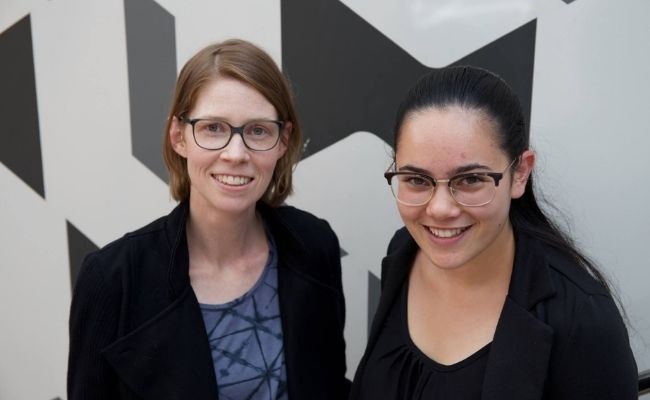
Dr Kim O'Sullivan and student Isobel Harris Clark both attended the same high school and are now working together as part of Isobel's summer studentship.
When Dr Kim O'Sullivan returned to her high school to speak with students as part of her post-doctoral research; it was the beginning of a new chapter for (then) high school student Isobel Harris Clark.
Fast forward six years and the pair are now working together over the summer months as part of Isobel's summer studentship. Dr O'Sullivan, Senior Research Fellow at He Kāinga Oranga/Housing and Health Research Programme at the Wellington Campus, has been undertaking research on housing and health with a focus on energy hardship in New Zealand since 2008.
“Energy hardship is when people can't access or afford enough energy into their homes to meet their needs for things like heating, cooking and hygiene,” Dr O'Sullivan says. “It's estimated that one in four homes in New Zealand face this challenge and it's also something we know is a struggle for our students.”
When Isobel, who is in her last year of her Bachelor of Arts (Geography and Politics), reached out to Dr O'Sullivan, it was decided that Isobel's studies could be useful in the aspect of this research that focusses on students.
“Seeing the numbers is so eye-opening. We've heard stories of mental health struggles due to living situations. The end goal is to help fix this situation by advocating for evidence-based policy that will make changes.”
“Kim and I both went to the same high school, Waiopehu College,” Isobel says. “Last year I was taking a paper in public health and I started looking into how poverty affects health. I remembered Kim's visit to my school and decided she would be a good person to talk to. She asked me if I'd be interested in applying for a summer studentship for November through February.”
Isobel's contribution to the study has been gathering information from a survey that has been completed by more than 600 students nation-wide at a range of different tertiary providers.
“Seeing the numbers is so eye-opening. We've heard stories of mental health struggles due to living situations. The end goal is to help fix this situation by advocating for evidence-based policy that will make changes.”
As part of her research, Isobel also investigated how COVID-19 had affected students financially due to spending more time at home and the resulting volume in power consumption.
“This study ended up expanding to become international, and two tertiary institutes from Canada will run a comparative survey. While my time in this research finishes up this month, the wider research will continue.”
Isobel says that this project has broadened her horizons when it comes to future career possibilities and looks forward to narrowing down what she will do when she graduates over this next year.
Are you experiencing unexpected financial difficulty? The OUSA Student Hardship Fund can help you out of a tight spot. It is open to domestic, international, full-time and part-time students of the University of Otago.